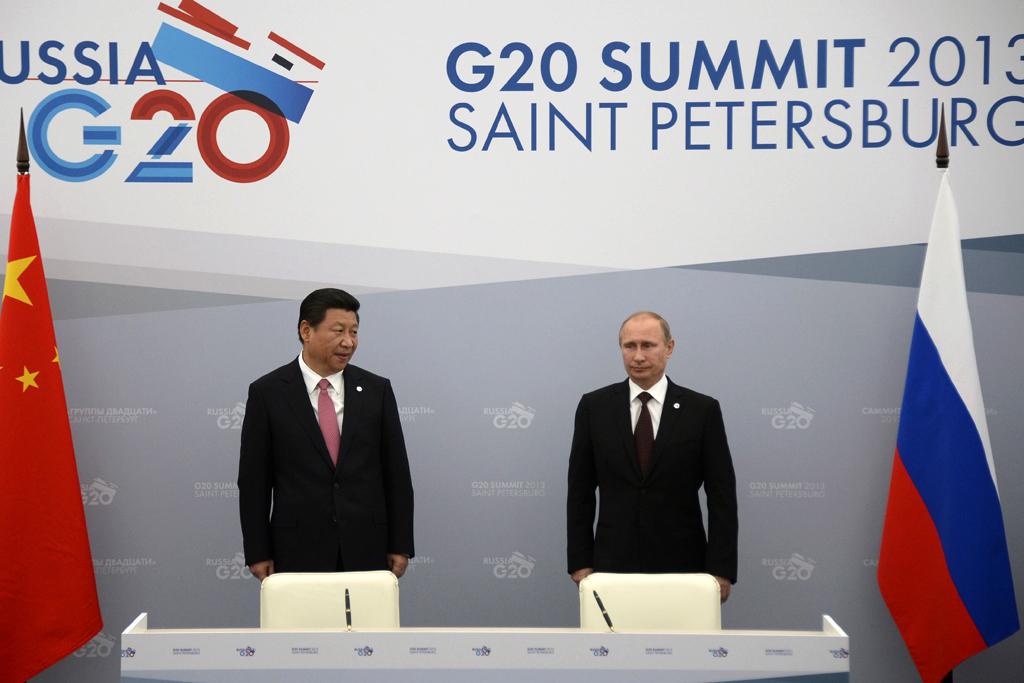China warns against Syria strike as G20 summit opens in Russia
Russia’s President Vladimir Putin (R) meets with China’s President Xi Jinping before the G20 summit on September 5, 2013 in Saint Petersburg.
China warned Thursday that a military intervention in Syria would hurt the global economy, as 20 of the world's biggest powers gathered for a G20 summit in the Russian city of St. Petersburg.
While the Syrian crisis isn't officially on the agenda, disagreements over whether other countries should intervene are expected to dominate the two-day meeting. The United States and France have been pushing for air strikes, while Russia and now China have cautioned the West to hold off.
China said Thursday that a strike on Syria could push up oil prices, which would have negative effects for fragile economies after the 2008 financial crisis.
"Military action would have a negative impact on the global economy, especially on the oil price — it will cause a hike in the oil price," said Chinese Vice Finance Minister Zhu Guangyao, according to Reuters.
Zhu said that a $10 rise in oil prices could push down global growth by 0.25 percent.
Back in Beijing, a foreign ministry spokesman added that unilateral strikes would violate international law.
More from GlobalPost: G20 Summit agenda likely to be dominated by Syria crisis
The G20 meeting in St. Petersburg is formally scheduled to discuss the economic slowdown in developing countries, but the agenda is increasingly dominated by the Syrian crisis.
In an interview with Russian television ahead of the G20 summit, President Vladimir Putin said that Russia had sold some components of the S-300 air defense missile system to Syria but has stopped further shipments.
He said that Russia did not exclude supporting a UN resolution on military strikes in Syria, but that better evidence was needed that the Syrian government had ordered the use of chemical weapons on its civilians.
Putin was isolated in his support for the Syrian government at the G8 summit earlier this year, but this week's G20 may find him with more allies against intervention in Syria.
US President Barack Obama's administration has pushed for an intervention in Syria to punish its government for allegedly deploying chemical weapons in an August attack that American estimates say killed more than 1,400 people.
In a stopover in Sweden ahead of the G20, President Obama said that it wasn't his credibility at stake, rather the international community's.
"The world set a red line when governments representing 98 percent of the world's population said the use of chemical weapons was abhorrent and passed a treaty forbidding their use even when countries are engaged in war," Obama told reporters, according to the Guardian.
"Keep in mind, I'm somebody who opposed the war in Iraq, and I'm not interested in repeating mistakes about basing decisions on faulty intelligence."
Despite tensions over Syria, economic issues will also play a central role at the summit as the recession continues to drag on in many countries.
Dealing with the continuing fallout of the economic downturn, promoting private investment in infrastructure projects and dealing with tax evasion are all on the agenda.
Obama also plans to meet with Russian gay activists during the summit, amid international criticism of Russia's new law against "homosexual propaganda."
Every day, reporters and producers at The World are hard at work bringing you human-centered news from across the globe. But we can’t do it without you. We need your support to ensure we can continue this work for another year.
Make a gift today, and you’ll help us unlock a matching gift of $67,000!
